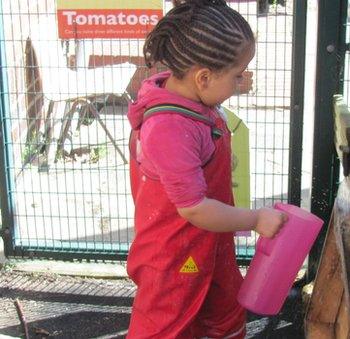Free nursery scheme rollout should be delayed, ministers urged
- Published

The free places can be in nurseries or with childminders
The expansion of free nursery places for disadvantaged two-year-olds should be delayed until good quality provision can be guaranteed, a report says.
The study for the Sutton Trust says England's scheme could help narrow the achievement gap between rich and poor.
But it says good quality childcare places are not yet available for the 92,000 toddlers already in free places.
Children's minister Liz Truss said 90% of places on the scheme were in good or outstanding settings.
Developmental benefits
She said the government was taking steps to raise quality, such as working with Ofsted to improve and strengthen the inspection regime, reforming early years qualifications and introducing early years teachers.
The government pledged to provide 130,000 free part-time nursery places to England's most disadvantaged two-year-olds from September 2013. But it has struggled to ensure enough places are accessible where they are needed.
And from September 2014, the scheme is due to expand to 260,000 places, funded by a £225m government grant.
But the report for the Sutton Trust education charity, by early education experts from Oxford University, says the current levels of quality in nurseries and among childminders may not be adequate to deliver this expansion successfully.
"The importance of ensuring good quality provision cannot be overstated. Worryingly, our review suggests that much current provision is not yet fit for purpose, risking the success of the programme in achieving its stated aims," the report says.
"Delaying the rollout would enable current good-quality provision to focus on catering for the most deprived 20% of two-year-olds (those most in need), whilst allowing the time and funding to ensure that sufficient good-quality provision is available to meet the needs of the 40% before this is offered as a legal entitlement.
"Relieving the pressure to find places would also enable the eligibility criteria to be tightened to allow only settings graded as good or outstanding by Ofsted to offer funded places."
The current guidelines say that good and outstanding settings "should" be used for the scheme, but if there is a shortfall of places then settings requiring improvement may be used.
Intellectually stimulating
The report adds: "If current provision is not of a sufficient standard to ensure developmental benefits, then expanding too soon will be counterproductive: spreading the funding too thinly will result in inadequate provision for a significant proportion of the children intended to benefit from the offer."
The report also calls for all childcare workers to have a relevant Level 3 (A-level standard) childcare qualification as the bare minimum to ensure standards are good.
It says: "This would represent the greatest shift for childminders, for whom there are currently no qualification requirements. Childminders have unique potential to nurture children from disadvantaged backgrounds.
"However, if these children are to make progress and catch up with their more affluent peers, they will need well-qualified practitioners who can offer an intellectually stimulating as well as a nurturing environment; and the quality they experience should be comparable (although not identical) to that experienced by children in group provision."
But Liz Bayram, chief executive of the Professional Association for Childcare and Early Years, said: "The vast majority of childminders - over 60% - already have a relevant Level 3 qualification."
She said her organisation believed all childminders should be required to have such a qualification and had lobbied to make this obligatory.
'Missing out'
Ms Bayram pointed out, however, that most local authorities were not using the good and outstanding childminders that were already there to deliver this entitlement.
Ms Truss also said that since September, 2,300 more trainees had been recruited to become early years teachers — a 25% increase on previous years. And that 1,000 bursaries of £1,500 are available for apprentices aspiring to a career in early years education.
"We have also introduced childminding agencies to improve the training and support for childminders and our Teach First for early education will drive up the quality of early years staff in those areas of real need."
She also wants to see more schools offering age-appropriate places for two-year-olds. A trial in 50 on-site nurseries in schools is continuing.
Shadow minister for children Lucy Powell said: "It is vital that the most disadvantaged two-year-olds get the best quality childcare to help them get the best start in life. There are 38,000 children missing out on childcare promised to them by this Tory-led government."
- Published13 November 2013
- Published7 May 2013
- Published11 November 2011